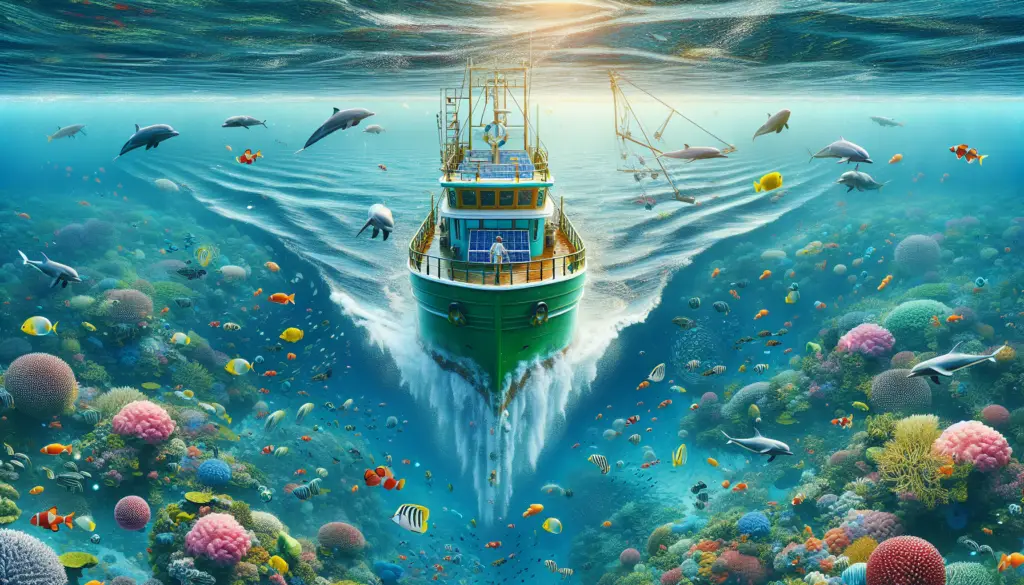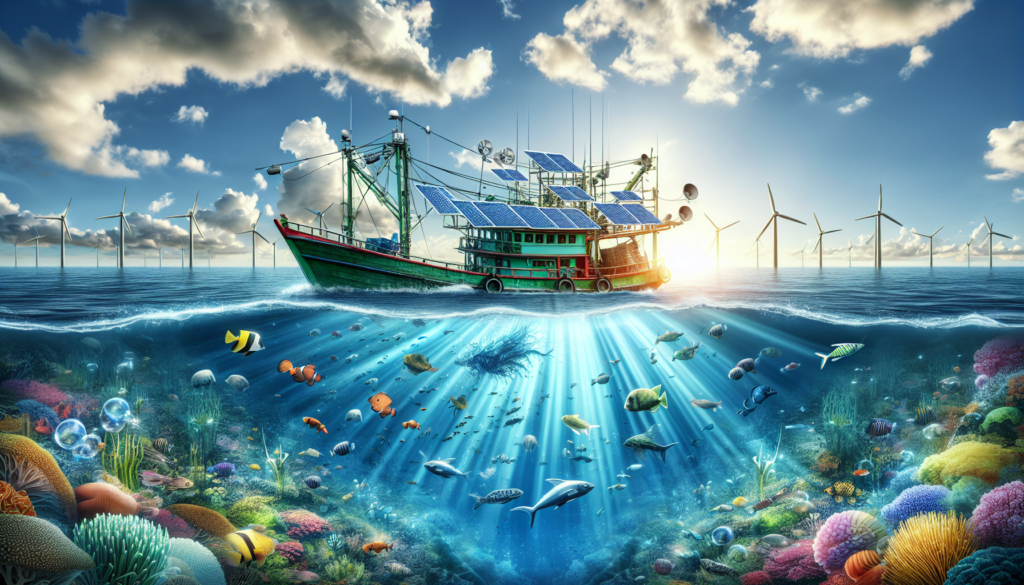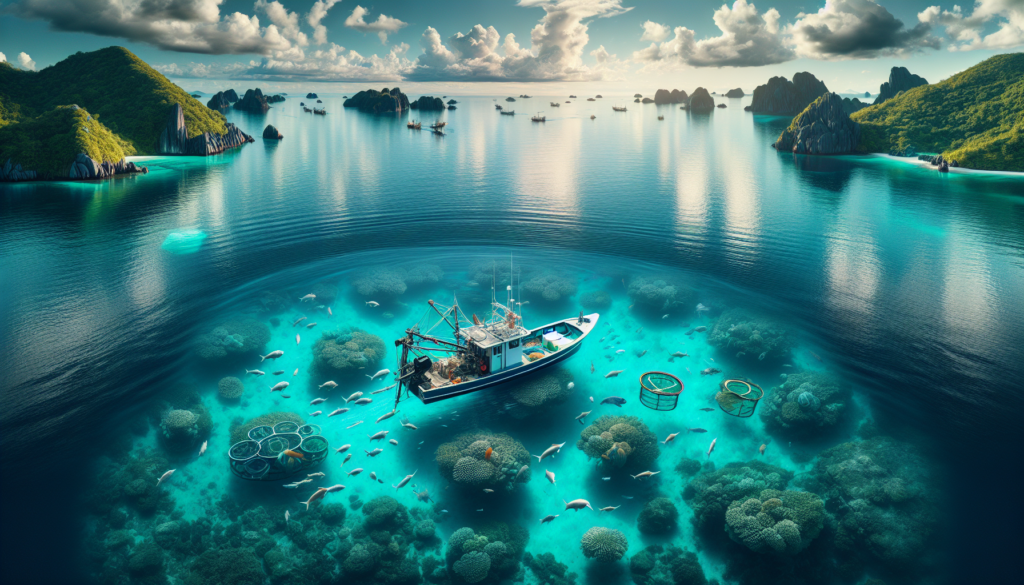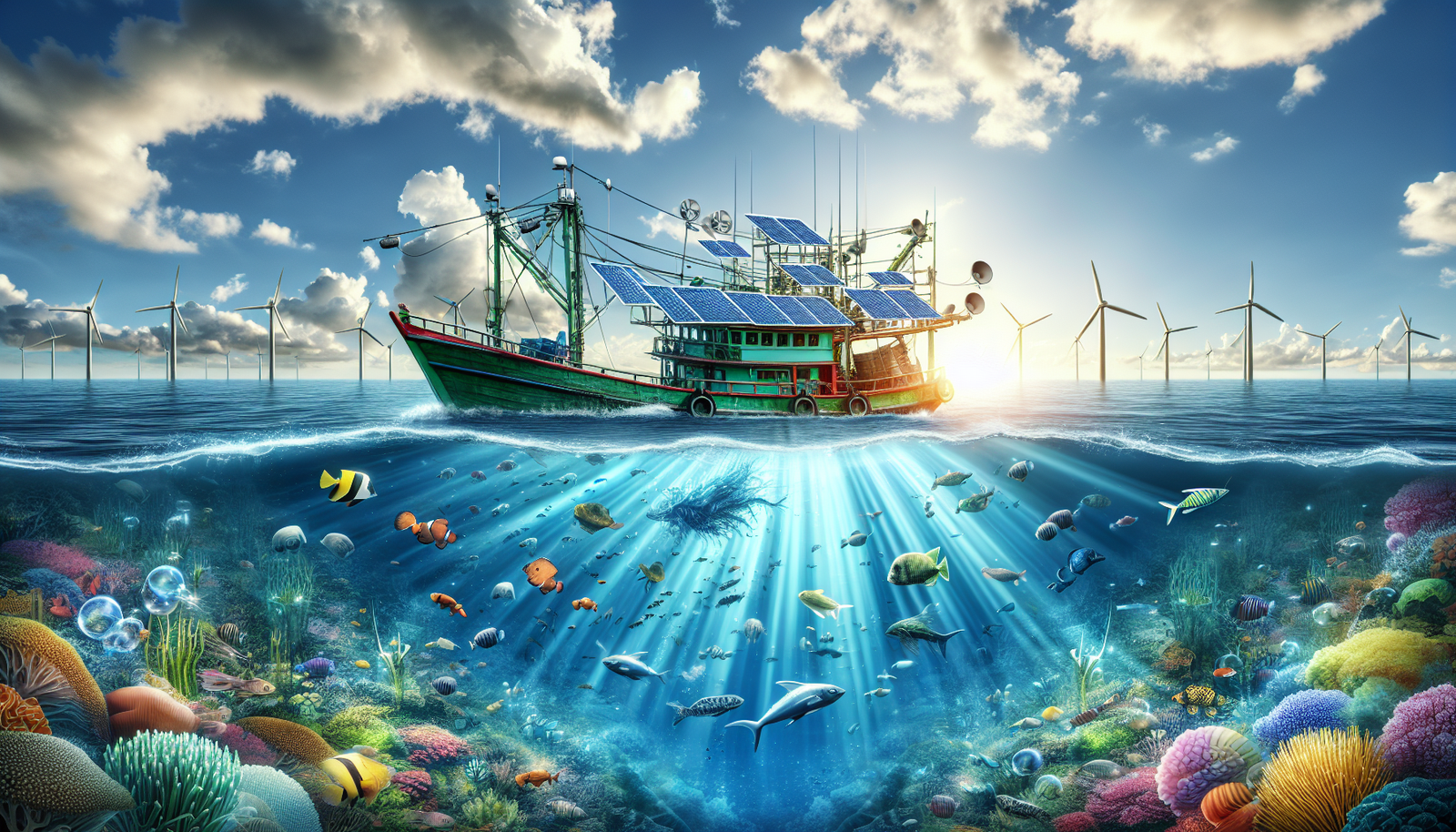As an avid boater, passion for the open water runs deep within you. But, have you ever stopped to consider the impact your hobby may be having on those aquatic ecosystems lurking beneath your vessel? In the article “Promoting Sustainable Fisheries Through Eco-Friendly Boating”, you’ll discover how the love for boating and fishing can go hand in hand with environmental stewardship. The piece highlights the importance of adopting more sustainable practices in our maritime activities, in order to safeguard renewable fish resources for generations to come. Because after all, your care for the environment and how you boat can make a world of difference to the health of underwater life.

Understanding Sustainable Fisheries
Understanding sustainable fisheries begins with recognizing their importance and role in preserving our marine ecosystems. Sustainable fishing means consciously choosing fishing practices that maintain fish stocks and the ecosystems that sustain them.
Significance of sustainable fisheries
Imagine sitting down to a delicious seafood meal, only to learn there aren’t enough fish left in the sea for the future. The fact is, sustainable fisheries play a significant role in our everyday lives. They provide a vital source of protein to billions across the globe, promote biodiversity, help in the stabilization of aquatic ecosystems, and support numerous local economies.
Current status of global fish stocks
Sadly, the current status of global fish stocks isn’t promising. The recent report from the Food and Agriculture Organization concluded that a third of the world’s fisheries are overfished. In the last four decades, we have observed a significant decrease in the number of commercial fish species caught globally as many species are exploited before they have a chance to replenish.
Implications of unsustainable fishing practices
And what’s the big deal, you ask? Well, unsustainable fishing practices can lead to numerous consequences, including the collapse of entire fisheries, loss of jobs in fishing communities, endangerment of marine species, and damage to the marine environment. This can also destabilize the food security of communities that depend on fishing as their primary source of sustenance.
The Impact of Boating Activities on Fisheries
Boating, though an enjoyable pastime for many, can unfortunately have harmful effects on fisheries. This involves several types of pollution, destruction of fish habitats, and even noise pollution.
Types of pollution from boating
Boating can lead to several forms of pollution. This includes pollution from fuels and oils, waste discharge, and litter. These pollutants can harm fish and other marine life directly or cause deadly imbalances in the ecosystems they inhabit.
Relationship between boating and fish habitat destruction
Another unfortunate consequence of boating is the destruction of fish habitats. Motors from boats can stir up the bottom sediments, increasing water turbidity and decreasing the amount of sunlight reaching aquatic plants required for photosynthesis. Additionally, anchors and chains can directly destroy coral reefs and sea grass beds, critical habitats for many fish species.
Noise pollution and its effects on aquatic life
Noise pollution, which is often overlooked, is another significant problem. Sound travels much faster and further in water than in the air, making underwater noise pollution from boat engines a severe disturbance for aquatic life. This noise can hinder communication, navigation, breeding, and foraging behaviors for many species.

Embracing Eco-Friendly Boating
Eco-friendly boating provides a sensible solution that allows us to continue enjoying boating without the negative impacts on our aquatic ecosystems.
Definition and importance of eco-friendly boating
Simply put, eco-friendly boating involves boating practices designed to minimize environmental impact. This includes reducing pollution, avoiding damage to sensitive habitats, and adopting energy-efficient technologies. Embracing eco-friendly boating is an effective way to help conserve our oceans, lakes, and rivers and the wonderful creatures that inhabit them.
Eco-friendly boating practices
Eco-friendly boating involves practices such as using environmentally friendly fuels and oils, disposing of waste responsibly, observing speed limits to minimize wake damage, and using moorings instead of anchors when possible to protect the ocean floor.
Benefits of eco-friendly boating for the environment and fish habitats
Adopting these practices can have significant benefits. It will not only reduce pollution and habitat destruction but also promote healthier and more resilient aquatic ecosystems allowing fish populations to recover and thrive.
Eco-Friendly Boat Designs and Technologies
Taking steps toward sustainability is not just about changing habits; it also involves innovations in boat designs and technologies.
Overview of sustainable boat designs
Sustainable boat designs strive to minimize the environmental impact of boating. These designs incorporate materials that are recyclable and have low environmental footprints.
Use of renewable energy in boating
One of the fundamental aspects of sustainable boat designs is the adoption of renewable energy sources. Boats powered by solar and wind energy are becoming increasingly popular. Not only do they reduce greenhouse gas emissions, but they also often offer quieter and smoother rides.
Emerging innovations in eco-friendly marine technology
The future is bright with emerging innovations in eco-friendly marine technology. For example, electric engines with zero emissions are becoming more efficient and affordable. Additive manufacturing, or 3D printing, is also enabling the creation of parts and even whole boats with less waste and more use of recycled materials.

Regulations and Policies supporting Eco-Friendly Boating
Adopting eco-friendly boating practices is one part of the equation, but it is equally crucial to support these efforts with effective regulations and policies.
Current policies and regulations on boating
Most countries have policies and regulations on boating to prevent pollution, safeguard marine habitats, and protect endangered species. These regulations typically cover issues like waste disposal, boat maintenance, and speed limits.
Role of international maritime organizations
International maritime organizations play a significant role in setting standards and promoting better practices. They work on everything from preventing pollution from shipping to setting guidelines for eco-friendly boat design and manufacturing.
Potential improvements in policy for sustainable fisheries
It’s apparent that more could be done, though. Potential improvements include more stringent regulations on pollutants, more substantial penalties for non-compliance, increased support for renewable energy in boating, and greater international cooperation on marine protections.
Education and Awareness for Sustainable Boating
Spreading the word about the impacts of boating and the benefits of sustainable practices is an integral part of transforming the industry.
Importance of education in promoting eco-friendly boating
Simply put, you can’t adopt best practices if you don’t know about them. That’s why education is key to promoting eco-friendly boating.
Existing initiatives and programs
There are already many great initiatives and programs around the world designed to increase awareness and understanding about sustainable boating. Boat shows, seminars, workshops, and training courses are just a few examples.
Strategies for increasing public awareness
There’s always room to do more, though. Strategies for increasing public awareness could include public service announcements, partnerships with popular boating influencers, and a larger presence in social media, publications, and events popular with boaters.

Marine Protected Areas and Eco-Friendly Boating
One of the key strategies for protecting marine environments and promoting sustainable fisheries is the establishment of Marine Protected Areas (MPAs).
Importance of marine protected areas in fisheries
MPAs are areas where human activities like fishing and boating are regulated to protect marine life. By providing safe havens where fish can breed and grow without human interference, MPAs can help fish populations recover and maintain a healthy balance
The relation between marine protected areas and eco-friendly boating
The relationship between MPAs and eco-friendly boating is crucial. Appropriate boating practices within MPAs can help preserve these areas and promote their success. These include respecting MPA boundaries, adhering to regulations, and avoiding damage to sensitive habitats.
Best practices for boating in marine protected areas
When boating in MPAs, it’s essential to be mindful of both visible and invisible boundaries. This includes reducing your speed, avoiding areas where wildlife is present, and using moorings instead of anchors to prevent damage to the ocean floor.
Economic prospects of Eco-Friendly Boating
Did you know that sustainable fishing and eco-friendly boating can also have significant economic benefits? Let’s unpack this a little bit more.
Economic benefits of sustainable fisheries
Sustainable fisheries enable fish populations to replenish and stay healthy, providing a stable supply of fish for fishing industries. This benefits not only the seafood industry but also tourism and other industries dependent on healthy marine ecosystems.
Job creation through eco-friendly boating
Likewise, eco-friendly boating offers potential for job growth. As demand for eco-friendly boats increases, so will job opportunities in manufacturing, sales, servicing, and other related sectors.
Economic feasibility and challenges of sustainable boating
Transitioning to eco-friendly boating is not without its challenges, though. Initial costs can be higher than traditional boating options, and some technologies are still under development. However, long-term savings from reduced fuel costs, coupled with growing consumer demand, will likely offset these challenges, making sustainable boating an economically viable option.
Community Involvement in Promoting Sustainable Fisheries
Promoting sustainable fisheries and eco-friendly boating is not just a matter for governments and industries. Communities, particularly those on the coast, can play a significant role in these efforts.
Role of coastal communities in promoting sustainable fisheries
Coastal communities can advocate for better practices, participate in local decision-making, and contribute to the local adoption and enforcement of regulations. They can also pioneer local initiatives for eco-friendly boating.
Community-based initiatives for eco-friendly boating
There are many ways communities can encourage eco-friendly boating. These can include education programs, local boating events promoting best practices, cleaning up local waterways, creating community guidelines for boating, and many more.
Importance of stakeholder engagement in decision making
Getting everyone on board is key. Stakeholder engagement ensures decisions are made collectively and that everyone’s needs and perspectives are taken into account. This makes for better and more sustainable decisions.
Future directions for Sustainable Fisheries and Eco-Friendly Boating
Looking to the future, promoting sustainable fisheries and eco-friendly boating will require embracing new technologies, advancements in policy and regulations, and continued commitment and collaboration among all stakeholders.
Adoption of new technologies for eco-friendly boating
New technologies will continue to emerge that make eco-friendly boating more accessible and effective. From improved electric engines to advanced materials and manufacturing techniques, the future is full of opportunities for sustainable innovation.
Policies and regulations needed for future sustainability
At the same time, policies and regulations should continue to evolve to keep up with these innovations, and to address ongoing and new challenges. Stronger protections for fish habitats, more substantial support for eco-friendly boating, and greater international cooperation will be key parts of this picture.
Commitment and collaboration among stakeholders for a sustainable future
Above all, commitment and collaboration among everyone involved—boaters, industry, governments, scientists, communities—will be fundamental for driving towards a future where fisheries thrive and boating is a part of our enjoyment and appreciation of our wonderful seaside landscapes.
In conclusion, sustainable fishing and eco-friendly boating are not just about preserving fish and their habitats. They’re about balancing our enjoyment of the world’s waterways with their necessity for survival. They’re about ensuring seafood for future generations and supporting the livelihoods of millions. It’s a big challenge, but with awareness, education, and action, we can meet it head-on.


[…] in protecting marine life while enjoying your favorite water-based pastime. This article, “Promoting Sustainable Fisheries Through Eco-Friendly Boating“, explores how making little adjustments to your boating habits can make a world of […]